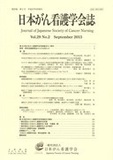Japanese
English
- 販売していません
- Abstract 文献概要
- 参考文献 Reference
- サイト内被引用 Cited by
要旨
本研究の目的は,がんの集学的治療を断念した患者を対象に,希望に関する体験を記述し,患者を支える希望の意味を明らかにすることである.緩和ケア科外来に通院する50〜60歳代の患者4名の協力を得て,半構造化面接を実施した.得られたデータは,現象学的アプローチであるGiorgiによる方法論を用いて分析し,固有の経験についてリアリティのある記述を目指した.
分析の結果,がん治療を断念した患者が一様に認識していたのは《限りある時間》に被投された自己であった.自分自身の死の近さを知りつつも《固有の自己存在》と対峙してきた研究協力者によって語られた希望には,自分自身で在り続けることを可能にする〈私で在ることの肯定〉,他者により自分自身の存在意義が明らかになる〈つながりの意味づけ〉,生物学的な終焉にとらわれない〈新たな未来の見通し〉という意味があった.このような意味を有した希望は,がん体験に特有な喪失や苦痛を経験するなかで,自分自分の存在を見失うことなく,最期まで生き抜こうとする自分を支える力となっていた.
以上より,がん患者の希望に関する看護を検討する際には,患者から語られる希望それ自体に着目するのではなく,まずは「私」という自己存在と関わり合う能力に注目すべきである.この能力を高めることが,統御のつかない死という存在を前にしてもなお,生きる力となる希望を獲得する可能性に開けていくと考える.
The purpose of this study was to explore patients' experiences of hope in cases where multidisciplinary treatment of their cancer had not been effective. The study sought to describe the meaning of hope as a resource sustaining such patients.
Four patients aged from their 50's to 60's who were palliative care outpatients participated in this study and underwent semistructured interviews using open-ended questions. Data were then analyzed using the phenomenological method devised by Giorgi with the aim of extracting realistic comments regarding specific experiences.
From the data, the following picture emerged: Patients for whom multidisciplinary cancer treatment was no longer appropriate were equally aware of themselves as having ‘limited time’. The hope spoken of by subjects who were confronted by their ‘unique self-existence’ while knowing that they were drawing closer to their own death was meaningful in several ways, including ‘affirming being themselves’, making it possible for them to continue to be themselves; ‘attaching meaning to relationships’, which clarified the meaning of their own existence via others; and ‘expectations for a new future’ that were not affected by biological death. Hope with such meaning did not let patients lose sight of their own existence, while experiencing the loss and pain specific to cancer; this hope sustained them, allowing them to cope until the end of their life.
The above results suggest that when investigating nursing techniques to support hope in cancer patients, attention should be first paid to the ability to interact with self-existence, that is, ‘myself’ in such patients, rather than focusing on the hope expressed by patients themselves. Increasing this ability may open up the possibility of acquiring hope that will help patients live while facing inevitable death.
Copyright © 2015, Japanese Society of Cancer Nursing All rights reserved.


